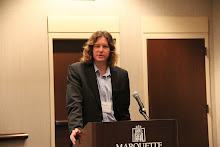"The force of pantomime does not consist in taking the place of speech to express ideas and emotions. Rather, it breaks with the causal logic of plots and the semiotics of the expression of passions."
Ranciere, Aisthesis: Scenes from the Aesthetic Regime of Art
". . . start pouring it out . . . steady stream . . . mad stuff . . . half the vowels wrong . . . no one could follow . . . till she saw the stare she was getting . . . then die of shame . . . crawl back in . . . once or twice a year . . . always winter some strange reason . . . long hours of darkness . . . now this . . . this . . . quicker and quicker . . . the words . . . the brain . . . flickering away like mad . . . quick grab and on . . . nothing there . . . on somewhere else . . . try somewhere else . . ."
Samuel Beckett "Not I"
"This apparent helter-skelter and disorder, finally, depicts real life in its capricious aspect more precisely than the most intricate moral dramas."
Theophile Gautier, Mademoiselle de Maupin as quoted in Ranciere, Aisthesis: Scenes from the Aesthetic Regime of Art
"folly -
folly for to -
for to -
what is the word -
folly from this -
all this -
folly from all this -
given -
folly given all this -
seeing -
folly seeing all this -
this -
what is the word -"
First 13 lines of "What is the Word" by Samuel Beckett
“What we call signifiance, then, is precisely this unlimited and unbounded generating process, this unceasing operation of the drives toward, in, and through language; toward, in and through the exchange system and its protagonists – the subject and his institutions.”
Julia Kristeva, Revolution in Poetic Language


No comments:
Post a Comment